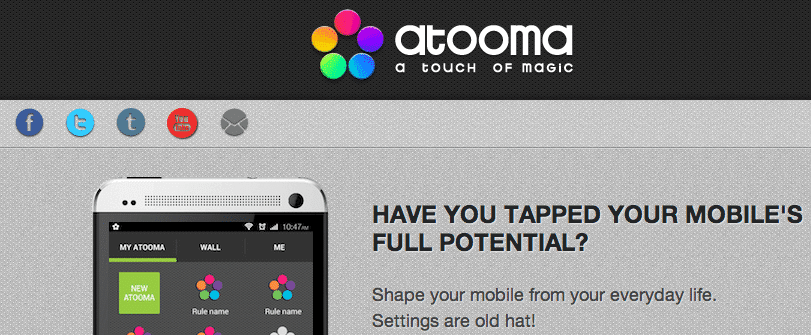
Apple’s Siri represents much of humanity’s first exposure to pocket “intelligence.” Asking questions, getting directions, and making calls / communications via voice opens up new possibilities for mobile technology, possibilities that Atooma CEO Francesca Romano thinks can go much farther, much faster.
Atooma is presently an app, designed to connect your phone to a number of external devices and so extend your will beyond phone commands. Though Francesca considers these automation steps to be the proverbial “tip of the iceberg” of Atooma’s capability, they will represent new possiblities for efficiency in daily phone use. For example, Atooma can have a phone’s bluetooth and internet browser turn off when the phone’s battery goes below 12%. Or, Atooma might automatically bring up your calendar when you call your assistant. Their Vimeo channel walks through the interface, but the idea is that a set of conditions will set off a series of actions from within the app, so that repetitive of effortful combinations can happen without thought.
Beyond the extension of automation actions, Atooma aims to apply contextual intelligence. For instance, if you are in your car, you may be able to say “car mode” and have your phone switch to a mode that puts on speakerphone for all calls, and reads your text messages aloud automatically. In addition, Atooma might automatically detect when you are at work, and put your phone on vibrate-only mode.
The game plan for Francesca is to take this concept beyond an “app” or a program, and into it’s own platform. Through Atooma, Francesca hopes to empower other programmers or creators of devices to set up automation sequences or integrate control through the phone. She’d like to see additional devices – from car doors to home appliances – fit in with Atooma’s automated actions. Imagine unlocking your house with just the presence of your phone, or the outside lights of your house coming on if you use the “flashlight” feature on your phone around the house at night. The possibilities are endless. There might be a line where efficiency meets redundancy, but it’s human nature to make things simpler, more comfortable, and less “manual.”
I talked to Francesca about my interview with Microsoft’s Jim Karkanias, about how efficiency in all it’s forms has not only comfort motives, but competitive and financial motives. Imagine if everyone else’s house was automated except yours? Most of us couldn’t hold a job if we didn’t have a cell phone to make work communication faster… when might many of these other automation steps be competitive “necessities” as well?
I asked Francesca (as I ask many of my startup guests), what five years into the future might look like with the development of this kind of contextual intelligence and extended device control. “I think that within 5 years, the technology will be inside us.”
In other words, Francesca sees a transhuman future as viable within a half decade (transhumanism and the transformation of conscious potential is a weighty topic – oft covered on our other blog, “Sentient Potential”). Some experts argue for longer time-frames, but it’s interesting to note. In the closer future, Francesca believes that some of the most important applications of this “extended personal assistant” concept might involve human interaction with vehicles – particularly for the purposes of safety.







